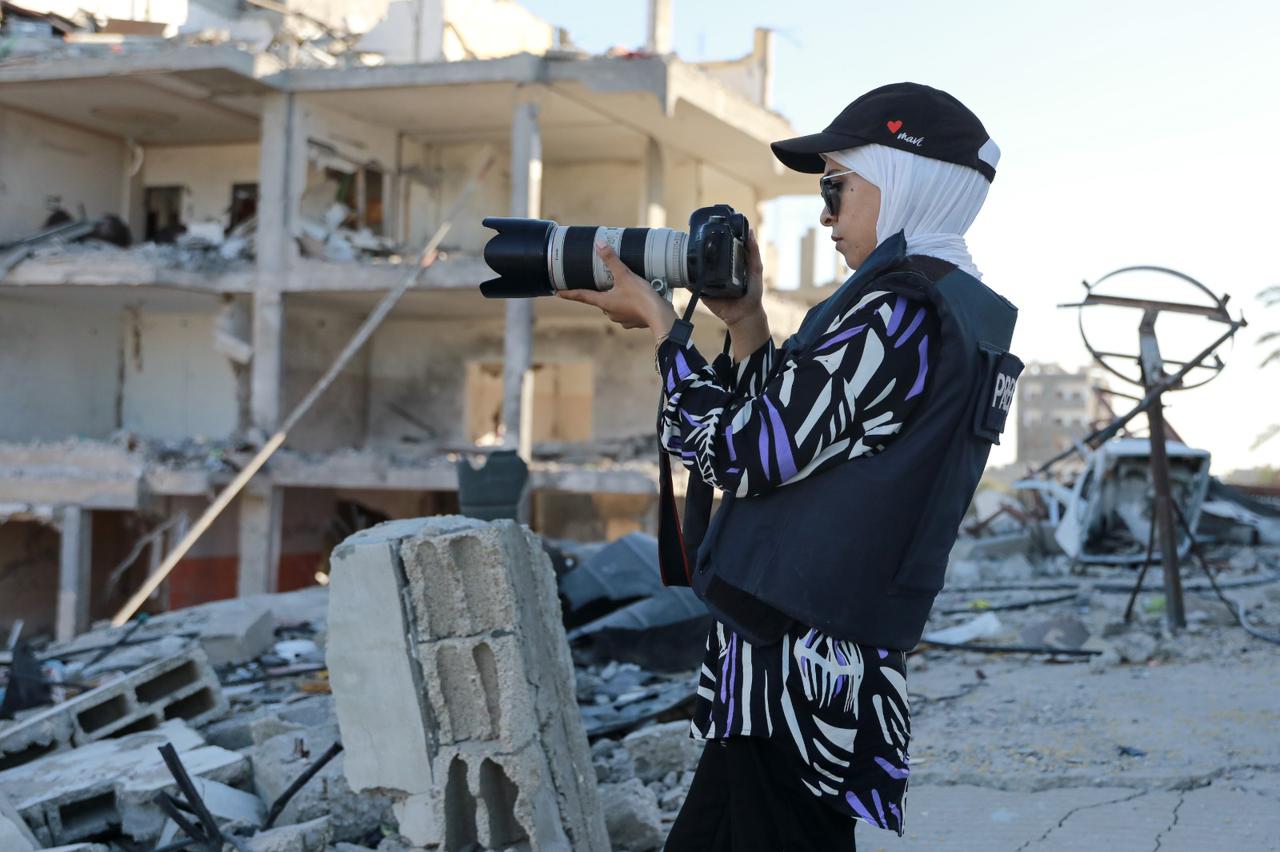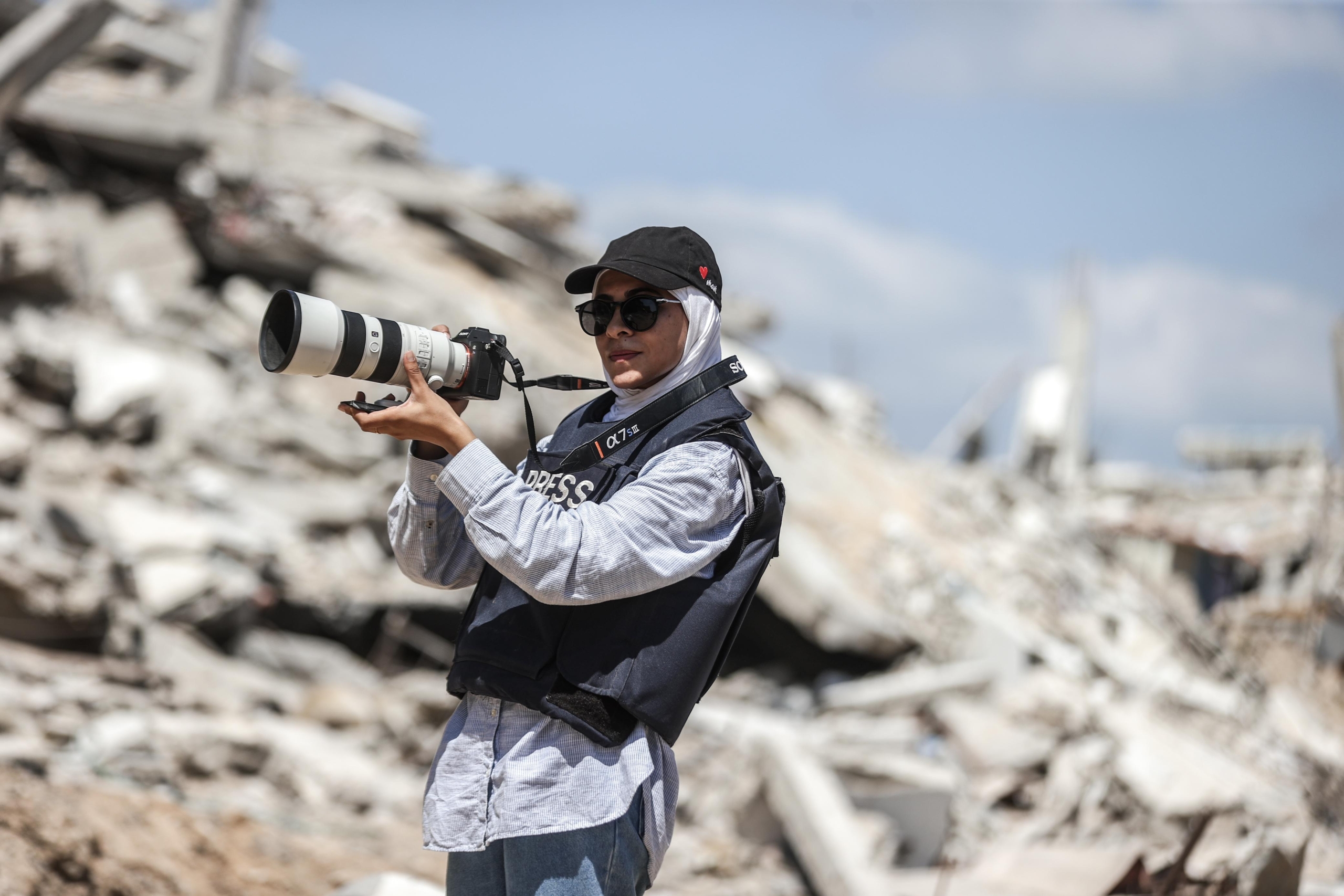Sign up for The Media Today, CJR’s daily newsletter.
On October 22, 2023, as the journalist Shrouq Aila was having breakfast with her family in Gaza, Israel bombed their neighborhood of Tel al-Hawa. With one hand, she held her infant daughter, and with the other, she held on to her husband, Roshdi Sarraj, also a journalist. Aila and her daughter survived the strike, but Sarraj did not. In the aftermath of his death, Aila, grief-stricken, was advised to give up on journalism in an environment where practicing it can get you killed. And yet she kept going.
Aila picked up the reins of Ain Media, a production company, cofounded by Sarraj, that works in video and other media; over the past year, she has continued to report on the realities of life in Gaza, and on the death and destruction brought by Israel’s siege. Among others, media workers have borne the brunt of the violence: according to figures maintained by the Committee to Protect Journalists, at least a hundred and forty-one journalists and media workers have been killed in Gaza, the West Bank, Lebanon, and Israel since Hamas attacked Israel on October 7 last year, the deadliest period for journalists since CPJ began gathering such data, in 1992. Last month, CPJ honored Aila as one of the four recipients of its 2024 International Press Freedom Award. The group described her story as emblematic of the plight of journalists in Gaza “who have endured the unthinkable and continue to report the news for the world to see.”
Recently, I spoke with Aila about the challenges of doing journalism in the deadliest place to be a journalist in 2024, what her typical day is like, and her commitment to keep reporting despite the loss and trauma she has experienced. Our conversation—conducted via an exchange of recorded voice notes, due to the patchy internet in Gaza—has been edited for length and clarity.

MB: This has been one of the most dangerous years for journalists worldwide, and nowhere more so than in Gaza. How do you reflect on the year gone by, especially in terms of the threats to journalists, and journalism, that you and your colleagues have faced?
SA: Looking back, this has been a year marked by relentless challenges, unimaginable risks, and profound loss. My colleagues and I have faced constant threats, from physical dangers like targeted attacks and bombings to psychological ones like the trauma of witnessing and documenting genocide while fearing for our own lives. The lack of protection for journalists has made our work even more dangerous. We have been targeted for trying to reveal the truth, with no functioning safe zones or guarantees for our safety. Yet despite the fear and exhaustion, we remain committed to our own mission to document these atrocities and violations, to give voice to the voiceless, and to hold those responsible accountable.
This year has underscored both the importance and the vulnerability of journalism in conflict zones. While the risks are immense, the need for truth is even greater. I hope the world recognizes the sacrifices that journalists make, and takes steps to protect those who risk everything to tell the stories that must be told.
Could you describe to me what a day in your life as a journalist in Gaza currently looks like?
I wake up early in the morning, because living in a tent means that you are not isolated from the surrounding noise. Then I walk to work, because there’s a lack of transportation and the available transportation is very expensive; plus, there’s a lot of traffic, because in the south of the Gaza Strip, there are almost two million people trapped in a very small area. Sometimes, I lose signal [on my phone] because of the constant attacking of the networks. So it takes me a while to contact the people I’m going to film. Once I am done filming, I go to a press tent that is housed in a hospital, and that provides electricity and internet. When it gets dark, I have to get back to the tent [I am living in]. Sometimes, I walk for an hour, or an hour and a half, until I arrive. Where I live—or where I have been displaced—has a very weak internet connection. It’s just suitable for texting, like on WhatsApp, and even that takes time. Once I arrive, I try to coordinate the next day of work, and it takes me a while to do that.
What is the biggest challenge you face as a journalist reporting on the ground in Gaza?
The biggest one is the sense of insecurity occupying me all the time, because wherever you are moving, you are not moving in safe areas, even though we are in this so-called “humanitarian zone.” It’s never a humanitarian zone, because thousands have been killed in this area. When it comes to coverage, you are not based in one location. And that sense of insecurity chases you—it’s just a nightmare. When I’m not in the same area that my daughter and family are in, I just keep thinking about them and checking the news about what is happening in that area.
You lost your husband, Roshdi, a year ago…
It was October 22, two weeks into the genocide. It was 11am; he had decided to eat breakfast and then go and do some coverage inside the ambulances going in to rescue people. He was interested in filming the process of how medical workers were reaching attacked areas and saving people’s lives. I was trying to convince him not to go, because at the time, there was a bombing of an ambulance every day. I was telling him that it’s super risky to go—it’s better to document the current situation inside the hospital, not to go on the ground with the ambulances. And he said, “If I do not do it, who is going to do it?”
We were around nine people inside the home eating breakfast together until we heard a massive explosion very nearby that made the table move. We rushed to the ground floor. He was beside me. I was holding his hand, and with the other hand, I was holding my dear daughter. She was eleven months old. In a second, he just moved and stood in front of me; he gave me a shield. I was putting my hand on his shoulder, like, “Roshdi, what are you doing? Just get back beside me, not in front of me.” And then the attack happened.
I remember that everything went gray. I wasn’t feeling good; I was injured. Then I started to smell the gunpowder, the concrete that struck me, the dust. I tried to look for my husband. I did not find him. I checked my daughter and touched her face, her body. She was safe. I tried to walk, but I wasn’t able to move my legs; there was something very heavy on them. I turned on my phone light. And I saw: there is Roshdi, along with lots of concrete around him. I pulled his hand. He did not resist.
We called the ambulances. They said, “The entire area is facing a carpet-bombing, it’s super dangerous to come. So we apologize for not coming. Once it’s done, we will reach the area.” Sometimes that takes six, seven hours. Roshdi had a very severe injury to his head. At that moment, he was gasping; he was alive. We decided to put him in a blanket and carry him to the hospital on foot. We were walking, and everything around us was being bombed and collapsing. It took us almost fifteen minutes to arrive at the hospital. I was just numb. All my focus was on my husband. We arrived at the hospital. After ten minutes, he passed away.

How challenging was it for you—both personally and professionally—to take over your late husband’s role at Ain Media?
It was never easy to continue after the murder of my husband. But Ain Media is a production company that was established to spread the truth about what is happening in Gaza, and I would not be the one to stop it from carrying on. Ain Media was founded by two best friends: Yaser Murtaja and my husband. Both of them have been killed now. Yaser was killed in 2018 by an Israeli sniper while he was on duty covering the Great March of Return [demonstrations that demanded an end to the Israeli blockade of Gaza and a right of return for Palestinian refugees]. Five years after his passing, his best friend and cofounder, Roshdi, followed him.
If you have the talent or the skill to spread awareness about the current situation, you have to do it. It’s your duty to go on despite the psychological aspects—I’m super traumatized; terrified most of the time. Sometimes, while filming, I feel, This is his camera, I still have the camera, but I don’t have him beside me—especially when I’m going to do coverage of devastating stories, about the pain of losing a dear one. It feels like they are just telling my story. And I get back home with the burden and heaviness of the heart.
In those moments, after your husband’s death, had you ever considered leaving journalism? What made you keep going?
I never think about leaving journalism. Never. I believe if you are a journalist, it feels like a sentence for life. It’s till the last breath, especially when it comes to being under the oppressor, being under occupation. As a journalist, I believe that I can make some change; I can tell the truth. It encouraged me to go on.
With so many journalists killed in Gaza, are people there worried about speaking to reporters in person? Are they scared that they might get attacked in the process, too?
I was filming in the camps, and I remember an old woman telling me, “Consider me as your mum. I advise you to leave this camera. This camera is going to kill you.” And I told her that it killed my husband. She told me, “Just go home. Stop working and stay with your babies if you have babies.” I said, “Yeah, I have one baby.” She said, “Don’t put yourself at risk. They are targeting doctors and journalists.” Sometimes, if you want to rent an apartment, the owner of the house asks if you are a journalist or not. If you are, they are not willing to rent you the apartment, because they have the sense that journalists are targeted.
You won CPJ’s International Press Freedom Award recently. What does that mean to you?
It means that there are people who care about us, that we are watched, that there are those who are considering our suffering. It’s a televised genocide. We have been slaughtered on a livestream.
What would you like to tell journalists and editors around the world who might be reading this?
I want to tell journalists around the world that you have to make a change. Israel is trying to control the narrative that comes out of Gaza; they are trying to manipulate the reality about what is happening. You have to put more pressure on the media to come and do coverage here in Gaza; we need foreign journalists to come and join us, to speak about our suffering, to spread this reality. I want them to come here and just report what they see. They will see the devastating conditions that we are living in.
Has America ever needed a media defender more than now? Help us by joining CJR today.



